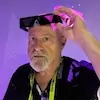
Welcome back to our weekly roundup of happenings from XR and AI realms. Let’s dive in…
The Lede
Apple is doubling down on immersive content for Vision Pro, unveiling a new slate of “immersive films” from partners including MotoGP, Red Bull, BBC, CNN, HYBE, CANAL+, and Apple itself. Two titles are available now via the Apple TV app on Vision Pro: a new episode of Apple Immersive and Tour De Force, a MotoGP documentary produced with CANAL+. Upcoming releases include a Red Bull freeskiing experience, a BBC Proms concert in VR, and wildlife and climate documentaries.
Feeling Spatial
Meta introduced Hyperspace, a new tool that lets Quest 3 and 3S users scan real-world interiors and transform them into 3D digital replicas in VR. The system, currently in beta, uses headset cameras to capture spaces in minutes, though outdoor scans aren’t supported yet. Only users 18 and up with the compatible headsets can join the rollout. While early examples showcase interiors like celebrity living rooms, Meta hasn’t disclosed pricing or how the feature will be monetized.
Global VR headset shipments dropped 14% year-over-year in the first half of 2025 as consumer demand remained weak, according to Counterpoint Research. Meta kept roughly 80% market share despite declining volumes. New models due in 2026 may change that. AR smart glasses showed the opposite trend, climbing 50% YoY, led by Ray-Neo, Viture, and Xreal. Birdbath-style video glasses made up 78% of shipments, while higher-priced see-through waveguide models captured 17% and are expected to grow with new products like Meta’s upcoming Ray-Ban Display. Counterpoint forecasts a 69% CAGR for AR smart glasses through 2027 as major tech players invest in hardware and expand use cases.
The AI Desk
Adobe has added generative video to Firefly Boards, integrating Luma AI’s Ray3, Runway’s Aleph, and Moonvalley’s Marey models into its collaborative moodboarding tool. Boards is available in more than 30 countries, but access to video features requires a Firefly premium plan or a Creative Cloud subscription with generative credits. Paid plans start at $9.99 a month for 2,000 credits, with higher tiers offering more capacity. Video generation is credit-intensive, so lower tiers may only cover a handful of short clips. Adobe also added Describe Image, visual presets, and in-image text editing to speed up concepting and iteration inside Boards.
Dusan Simic has created a Gorillaz homage with a series of videos featuring an album of music he created with Suno AI. He told me he made this four-minute video in a day.
Neon has surged to the No. 2 spot on the Apple App Store’s Social chart with a provocative model: it pays users up to $30 per day to record phone calls, then sells the audio to AI firms for model training. Seriously. They record your calls and pay you up to $30 a day for the data. The app records only the user’s side of calls unless both parties use Neon, but experts warn that in many U.S. states, all-party consent is required. Neon’s terms grant broad, irrevocable rights to distribute and sell the recordings. I guess most people feel they need a few hundred bucks a month more than they need to keep their innocuous conversations to themselves.
Meta has introduced Vibes, a new feed for AI-generated short videos inside the Meta AI app and on meta.ai. Users can create videos from scratch, remix existing ones with new visuals and music, and share them on Vibes or cross-post to Instagram and Facebook stories and reels. The feed is meant to encourage experimentation and discovery of generative video content. Engadget described it as a “feed for AI slop,” reflecting skepticism that it could be flooded with low-quality material, but I don’t know about. Content is liquid. Here you can play. People might love this.
Echo Hunter and its new prequel, Echo Hunter: A Memory Too Far, by filmmaker Kavan Cardoza (aka Kavan the Kid), who had previously amazed audiences with his Star Wars Fan Film, Ghost Apprentice, have been released on YouTube and Escape AI. Kavan is also the co-founder of Phantom X which partnered with Kling AI to host a sold-out premiere at the Pacific Design Center in Los Angeles on September 20th.
Leonardo.Ai has launched the Leonardo Imagination Fund, a $50,000 microgrant program supporting five creative projects across film, fashion, art, architecture, and design. One grant is reserved for an Australian creator to spotlight local talent. A panel including filmmaker Alex Proyas, Monks co-founder Michael Dobell, and Curious Refuge co-founder Shelby Ward will choose recipients. Leonardo.Ai’s Head of Creative Dwyane Koh said the initiative is meant to give artists freedom to experiment with AI and “push the boundaries of creativity.” Applications are open now, with winners expected to be announced later this year.
Lionsgate Not Finding Much Use for Runway AI. According to The Wrap, despite expansive claims of bold collaboration, Lionsgate doesn’t have enough data for Runway to make a proprietary model.
Spatial Audio
For more spatial commentary & insights, check out the AI/XR Podcast, hosted by the author of this column, Charlie Fink, and Ted Schilowitz, former studio executive and futurist for Paramount and Fox, and Rony Abovitz, founder of Magic Leap, Mako Robotics, and Synthbee AI. This week’s guest is Paul Travers, founder and CEO of Vuzix. You can find it on podcasting platforms Spotify, iTunes, and YouTube.
 Charlie Fink is an author and futurist focused on spatial computing. See his books here. Spatial Beats contains insights and inputs from Fink’s collaborators, including Paramount Pictures futurist Ted Shilowitz.
Charlie Fink is an author and futurist focused on spatial computing. See his books here. Spatial Beats contains insights and inputs from Fink’s collaborators, including Paramount Pictures futurist Ted Shilowitz.
